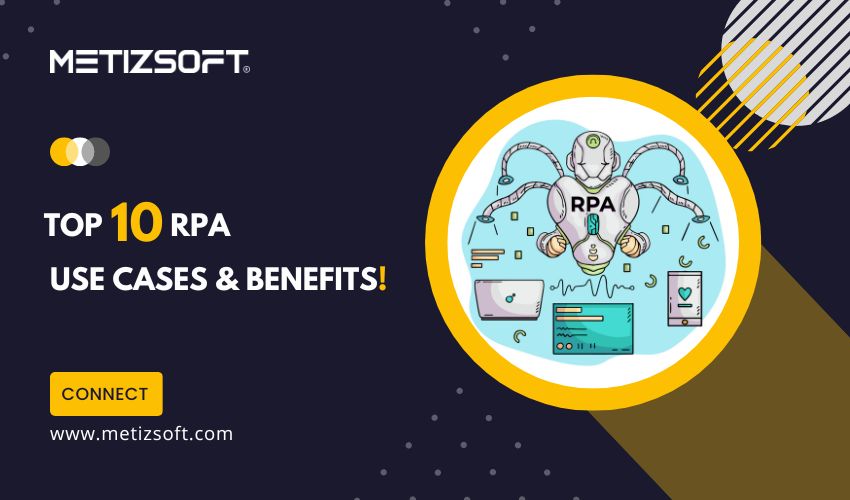
Robotic Process Automation (RPA) is revolutionizing industries of all sizes and niches by automating repetitive and rule-based tasks that humans traditionally perform. This technology has various applications across different sectors, streamlining operations, reducing errors, and enhancing overall efficiency.
The best part is that RPA seamlessly integrates with the existing IT infrastructure without requiring additional installations. Therefore, companies interested in implementing RPA into their existing systems must not invest heavily to automate essential processes.
Here are some top RPA use cases across different industries:
Table of Contents
RPA Use Cases
RPA enables businesses to automate complex, less rule-based operations. Many large corporations have already implemented Robotic Process Automation to streamline their operations. However, RPA has numerous other applications. Some of the most notable examples of RPA applications include:
Human Resources and Management – Automating administrative HR tasks such as onboarding and offboarding, employee record management, and payroll operations can be achieved with the help of RPA.
Supply Chain Management – RPA can optimize supply chain operations by automating inventory management, order processing, and shipment tracking. Moreover, it can help streamline the procurement process by automatically updating inventory levels, generating purchase orders, and managing supplier communications.
Finance and Accounting Automation – RPA automates finance tasks like accounts payable, receivable, and reporting. It extracts data, reconciles accounts, and generates financial statements for greater accuracy and speed.
Telecom Automation – Robotic Process Automation has the potential to transform the telecom industry by increasing efficiency in operations, supply chain management, enterprise administration, and customer support.
Media Automation – RPA technology has revolutionized the media industry by streamlining various content creation processes, such as generating news summaries, creating sports visualizations, and crafting advertisements. It enables over-the-top (OTT) platforms to provide customized recommendations and ensure seamless content searchability.
Moreover, it has optimized service request management and enhanced customer engagement, leading to the allocation of additional resources for the development of fresh and innovative content.
Invoice Processing – RPA automates data input and reconciliation, reduces errors, and even facilitates specific decision-making processes required for invoice processing. Consequently, this minimizes the need for human intervention and ensures timely and accurate payments.
Automate Testing – RPA tools are utilized to automate common test scenarios. These tests are executed after each version to ensure no new bugs are introduced in the code. RPA tools help simplify testing and enhance software quality.
Healthcare Process Automation – This advanced technology helps streamline healthcare operations by automating patient scheduling, claims processing, and medical records management tasks. As a result, it reduces administrative burdens and allows for greater focus on patient care.
IT Operations and Management – RPA can automate various IT tasks, including system monitoring, software installation, and data backups. Additionally, it can proactively detect and address potential system errors, thereby minimizing downtime and improving overall system performance.
Manufacturing Process Automation – RPA can automate inventory management, production scheduling, and quality control. It optimizes production, reduces costs, and ensures quality output.
RPA Benefits
Implementing Robotic Process Automation (RPA) offers several key benefits for businesses across various industries. Some of the notable advantages include the following:
- Automate repetitive, mundane tasks, allowing employees to focus on more strategic, creative, and value-added activities.
- Significantly reduce operational costs associated with labor, human errors, and rework.
- Fasten processing time
- Enhance efficiency by digitizing and auditing process data.
- RPA performs tasks consistently and accurately, minimizing the potential for human error.
- RPA allows organizations to scale operations quickly without significant additional infrastructure costs.
- RPA can collect and analyze large volumes of data, providing valuable insights into operational performance and customer behavior.
Bottom Line
As you can see, RPA is emerging as a game-changing tech stack for industries of all sizes and niches. Its mechanism is easy to operate, and one can precisely implement it in several exciting ways. However, it requires some practice. Once you finish the initial stages, you can quickly adapt and work productively. However, we suggest you hire RPA Experts for a precise and agile RPA process.
If you’re a business or brand owner looking to boost productivity, we recommend trying RPA. It’s a highly effective solution that can help you automate processes within your business ecosystem. You don’t have to dive in headfirst – start small and automate one process at a time to see if it’s the right fit for your company. If you need professional assistance, partner with Metizsoft Solutions today!
AboutManthan Bhavsar
Related Posts
What is RPA: 6 Essential Facts for Robotic Process Automation
The ongoing and rapid shift toward Artificial Intelligence (AI) and automation is comprehensively reshaping the modern...
Top 10 Impactful Benefits of Robotic Process Automation (RPA)!
From a buzz/trend to real-time implementation, Robotic Process Automation (RPA) has quickly become the primary asset of...

